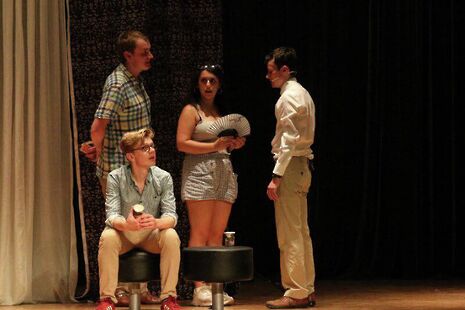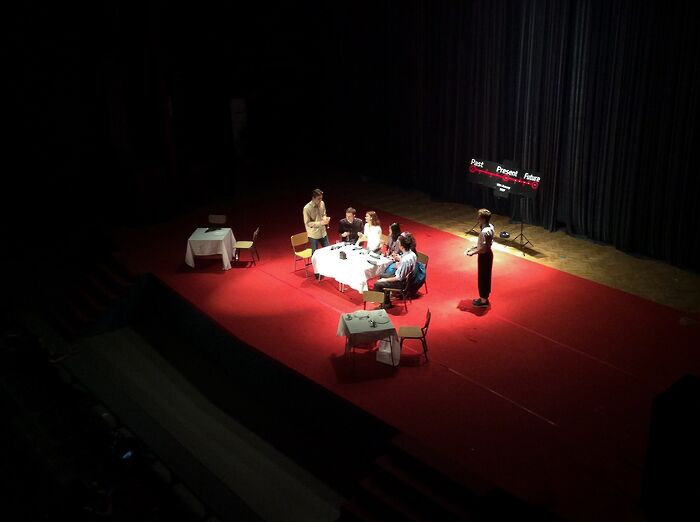Lady Windermere’s Fan review
Pleasingly grounded by women, this production of Wilde’s classic script shines brightly when the actors are left to just get on with it

Fresh back from their tour around venues across Asia and a night at OSO Arts Centre in London, this year’s UCATT production, ‘Lady Windermere’s Fan’, hit Cambridge for its home run with the promise of fun, fancy, and more than a little silliness. More than this, however, the show sought to answer the perhaps age-old question of adaptation: should a classic such as ‘Lady Windermere’s Fan’ be modernised, dabbled with, or left as it is? It’s never easy to answer this kind of question, but I was looking forward to watching this cast and crew – helmed by Rhiannon Shaw as director – give it a go.
On a technical level, the details of this production have been carefully honed by Johnny King to match the premise of this modernised approach – young and fun in an ironic, self-mocking, tongue-in-cheek sort of way. The set has a simplicity that one presumes must have been required for a month of touring away worked well on the Corpus stage; comprised at its most crowded moments of only a few seats and a chez-lounge, it was what an observer might initially label as a little too minimalist for a Wilde play, but in reality was the perfect layout for letting the show breathe and come to life on its own.
The space was used well by actors and the movements and transitions by all on stage were consistently slick – again a virtue of having toured with the same show for over a month now, but also commendable in its own right, because they must have had to establish blocking and movement that can be adapted well to a variety of venues. King’s choice of sound and lighting design also matched the feel of the show well, and was certainly technically impressive, but occasionally both seemed a little overblown or perhaps excessive, going too far to distract the audience from the dialogue or events of the play itself.
"the space was used well by actors and the movements and transitions by all on stage were consistently slick"
Indeed, I found that the reality of this production is that it shines best (and when it shines, it shines brightly) when the actors were left to just get on with it. Pleasingly – considering this is not often the case with Wilde – it is the play’s women who ground the show. Anna Wright’s portrayal of the titular character is arresting in its variety – she is funny, naïve, and beautifully vulnerable, occasionally all at once, and one looks forward to the next time she is due to enter onstage. Similarly, Ella Blackburn as Mrs Erlynne is magnetic. She switches between a manipulative confidence and her own form of delicate openness sometimes between breaths, never for a moment requiring a suspension of disbelief from the audience that both versions of her character are the same woman.
When boiled down to it, the plot of Wilde’s play – which is certainly a more serious precursor to his later, lighter ‘Importance of Being Earnest’ – centres around these two women, grappling with their own places in society, understanding of the world around them, and the relationships they have within it. “Does life repeat its tragedies?” asks an agonised Mrs Erlynne of an empty stage halfway through the second act. Both her and Lady Windermere are, throughout the play, continuously attempting to answer this question, however subtly or unconsciously. The ability of both Wright and Blackburn to tap into this propels the show, and provides the perfect foundation on which Joe Pieri and Eduardo Strike (as Lord Darlington and Lord Windermere, respectively) can build their own convincing characters. Max Harrison provides a turn as both Lord Augustus and (within the play’s modern-era plot) Nick that is delightful in its natural, down-to-earth humour, at times offering a kind of comic relief. Though the cast was consistently strong, there were instances in which Wilde’s writing – almost always laden with witticism after witticism – was not paid its due. Long humorous speeches near the beginning of the play seemed to have a recited quality to them, and efforts to make the dialogue sound natural sometimes resulted in delivery being far too fast.
"Ella Blackburn as Mrs Erlynne is magnetic"
But if we allow for first night jitters, or even a post-tour hangover, perhaps the production’s biggest pitfall was what it advertised as its conceit: the intermittent side-plot of director O.W.’s (Maya Yousif) attempts to make Oscar Wilde modern. Early on in the show, the implication that this isn’t particularly the best idea is made clear to the audience – the character of O.W. is made deliberately overbearing and over-ambitious, in a clear parody of the directors that we come across too often both in amateur and professional theatre, who become carried away with a concept and forget the text itself. Thus, all the modern aspects of the play take on what is intended to be a wry, tongue-in-cheek quality. Ironically, however, it was these moments of the modern subplot, when the play was paused in order for O.W. to continue musing on her artistic vision, or argue with her own actors, that detracted the most from the show. There seemed an attempt to labour the point that modernisations are often misled and misfired a little too much to the audience, in a way that was occasionally patronising, and the jokes in these modern sections themselves seemed a little too brash, or reliant on cheap laughs (as amusing as seeing Benedict Clarke and Elliott Wright passionately embracing was). This made the actual sections of Wilde’s play almost relieving to get back to, and certainly all the more interesting. The modernised element of the show made a conclusive point that a classic such as ‘Lady Windermere’s Fan’ almost certainly ought to be left well alone – so the question is, why wasn’t it?
 News / Uni Scout and Guide Club affirms trans inclusion 12 December 2025
News / Uni Scout and Guide Club affirms trans inclusion 12 December 2025 News / Cambridge Vet School gets lifeline year to stay accredited28 November 2025
News / Cambridge Vet School gets lifeline year to stay accredited28 November 2025 News / Cambridge study finds students learn better with notes than AI13 December 2025
News / Cambridge study finds students learn better with notes than AI13 December 2025 Science / Did your ex trip on King’s Parade? The science behind the ‘ick’12 December 2025
Science / Did your ex trip on King’s Parade? The science behind the ‘ick’12 December 2025 News / Pembroke to convert listed office building into accom9 December 2025
News / Pembroke to convert listed office building into accom9 December 2025








